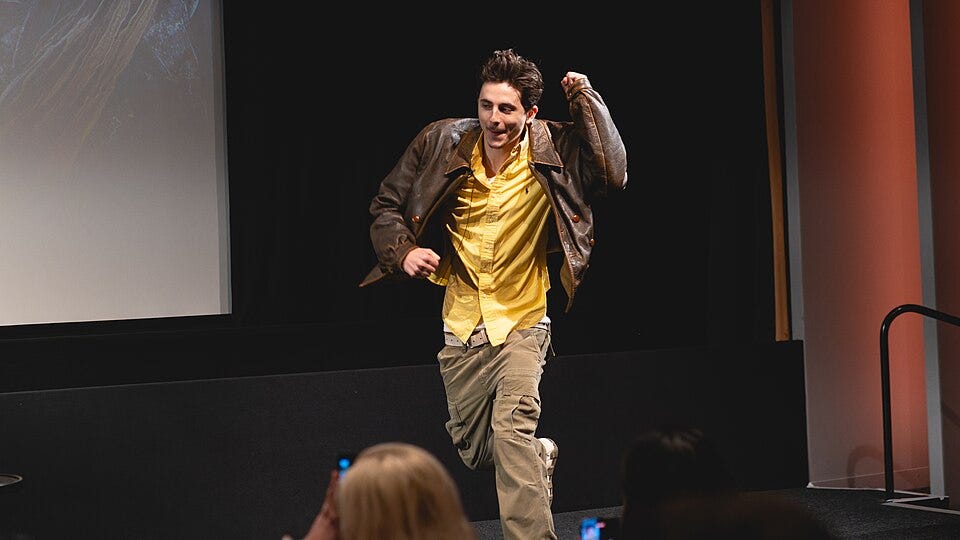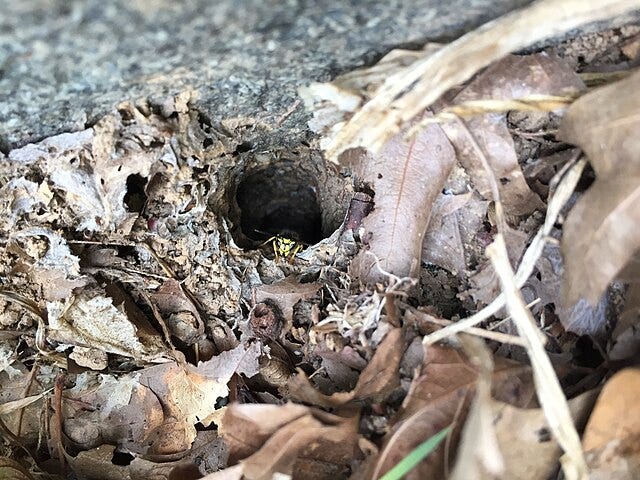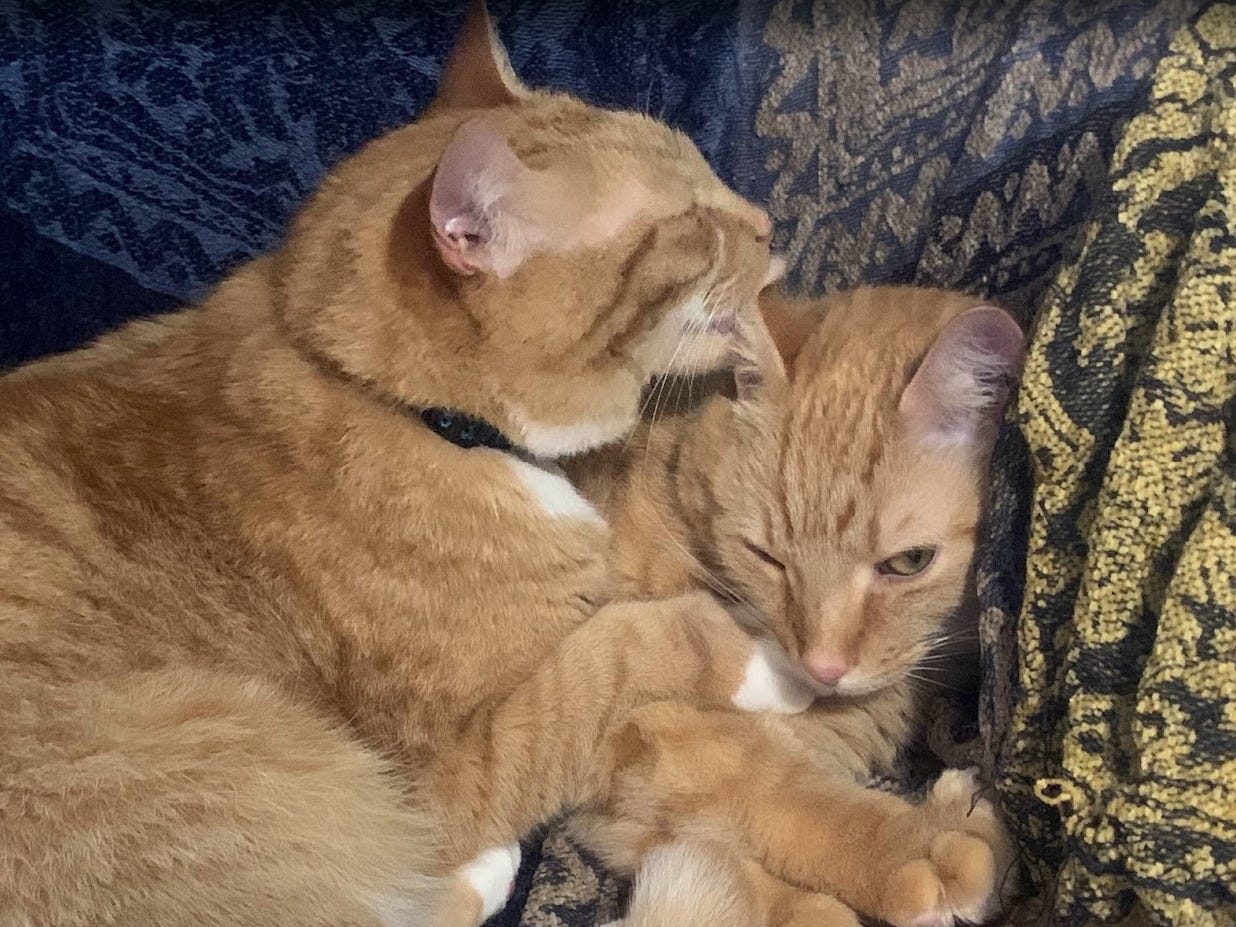Wonka Logic
I'd rather be stung by a horde of yellowjackets than watch this movie again
My debut novel, The Unmapping, about a disaster in which cities rearrange and characters similarly transform, is available wherever books are sold. said it “deserves to be the Novel of the Summer for 2025, because it just works for the times we live in, meeting the moment on so many levels.” Summer is soon to be over and the e-book is still on sale for $3.99 so don’t let it pass you by!
As I write this I’m thinking about what I want to say but I’m also thinking about my arms. Specifically, the itchiness on my right wrist and left elbow. On Saturday I was stung by three yellowjackets. On Sunday I scratched the areas lackadaisically throughout the day. On Monday the red sting areas had gotten bigger and redder and much, much itchier, expanding all the way up and down my forearms. This may not be a surprise to you, but it was a surprise to me. I get many mosquito bites and sometimes I scratch them and they still go away. With the yellowjackets, though, the scratching is clearly making it worse, and an internet search confirms that yes, I was stupid with all my scratching, it’s time to stop. So I’ve learned to stop scratching them. Now I sit here, dousing my skin with cortisone cream, fuzzy from antihistamines, suffering from restraint, but for a good cause. I have learned from this experience. There was a logic to it. Get stung, scratch, learn not to scratch. Also, don’t step on yellowjacket nests.
The same day I got stung, I watched the Timothée Chalamet Wonka movie. (Not by choice, it was a nephling-led fiat).
And I liked it.
This terrifies me.
The whole time I was watching, I understood that nothing made sense. And yet still I liked it. Dear reader, I even cried at the end. I felt no connection to this movie or its characters at all and yet I could see the tiny mechanical levers pulling on this heartstring and that one, crying out, “motherhood! family! deep unbreakable love!” over a swelling orchestral climax.
I’m not worried about spoiling it, because if you haven’t seen it, you definitely don’t need to. The movie adds nothing to the Willy Wonka universe—in fact it detracts from it. It ends with Willy learning that the most important ingredient of chocolate is friendship. Yes really. And then he goes off and builds a chocolate factory and—if we’re staying true to the lore—hides himself from the world for decades, friendless and isolated, forgetting everything he learned. Okay, then!
So the overarching movie logic doesn’t make sense, but the scene-based logic doesn’t, either. For just one example, Timothée Chalamet speaks with an American accent throughout this, as do about half of the characters, with the others ranging around London English and Cockney and a bit German and also, for some reason, Jersey Shore. Okay, maybe it’s a cosmopolitan city, fine. But then we get the flashback to little Willy in a cabin in the woods with his mother. This mother has the thickest, most cartoonish Irish accent you can imagine.
And Willy still speaks in an American accent.
(It itches so bad.)
Back to the mother. We have a couple scenes of them living in a boathouse on the river. The mother gathers one cocoa bean each week, accumulating enough to create exactly one chocolate bar per year, which she gave to Willy on his birthday. Why only one cocoa bean per week? What sort of tree provides exactly one cocoa bean each week? And keeps producing at an exact rate year-round? In real life, cacao trees have pods with about 50 beans on average! Where do the rest of them go? Is she hoarding them?
There is a scene in the zoo where Willy’s young friend Noodle notices all the flamingos standing around. “Why don’t they fly away?” she asks, to which Willy responds: “I don't know. Perhaps they haven't thought of it.” The two of them proceed to fly off with a large bundle of balloons, which led to a scene of them dancing on a glasstop roof, one of the scenes that, despite everything, I loved, both beautiful and emotional. And the flamingos, they learned to fly! All because they saw the two weirdos flying with balloons and thought, “maybe I should do this too.”

Forget the fact that typical flamingos don’t fly from zoos because they have their wings clipped. Have they never seen a bird before?
(I’m running low on cortisone cream.)
The mother dies when Willy is young, of course, because this is his emotional throughline. His other arc is learning how to read. He starts out illiterate, which is how he gets himself into accidental slavery. Before his mom died she gives him one last chocolate bar with a handwritten note revealing her secret ingredient (which is, as mentioned earlier, friendship).
BUT HE CAN’T READ! What cruelty is this?
“It’s allowed to be nonsensical!” I can hear you yelling. “It’s a movie for kids!”
Is it though? The original book and movie are, sure. Willy Wonka puts five golden tickets in his chocolate bars under the presumption that children will be buying these bars and receiving the tickets so he can determine his heir. In the look-at-me-wacky Depp remake, also, the movie is filled with kids. In Timothée Chalamet’s Wonka, however, there is exactly one child with lines, named Noodle. One or two children are shown briefly as extras. (And if any of those extras happened to say a word or two, it was so unmemorable they didn’t register). Otherwise, there’s not a child to be found. It’s the adults going crazy for the chocolates, adults throwing their money at him to purchase his wonders. Adults enslaving Wonka, adults trying to entrap him, adults working to free him. Timothée Chalamet is twenty-nine years old.
I don’t think everything in the world should make sense—many things don’t. Out of all the volunteers whacking down trees in the arboretum that day, why was I the only one to get attacked by a hidden nest of yellowjackets? Because it happened; there is no secret reason, no childhood trauma I needed to outrun. No hidden lesson about the value of friendship. (Although we all got a stern warning from the volunteer leader about how to avoid a hernia.)
And I can handle a suspension of reality. Between the yellowjacket stings and the Wonka movie, we and the nephlings went kayaking in Lake Mendota, where we pretended that we were lost at sea for days, months, years, and that the other kayak was a moving island, and that the ducks were enemy pirates we needed to squirt with water blasters (more like gentle water showers).
(I’ve added a thick layer of calamine lotion, which seems to be helping.)
If there is one theme amid all the nonsense, it’s how important it is to dream. Willy dreams of owning a chocolate shop. Noodle dreams of finding her mother. Strangers on the street are yearning for each other in hopeless love. Not super original, but that’s okay. I agree that it is important to dream. I am a big fan of dreaming, yearning. But there is a missing link between the dream and the dreamer. In the movie, the act of dreaming makes the dream happen. In reality, there are letters between A and Z. In the movie, gone is Roald Dahl’s vision of Willy Wonka, reclusive genius, putting his entire life into making marvelous creations. Here is a goofy magical Wonka that creates chocolate out of thin air despite, repeatedly throughout the movie, losing all his wares. Poof! Don’t worry about what you just saw; have a chocolate.
We were kayaking on a windy day and the waves kept pushing us into the middle of the lake. It was hard getting back. Should we have thrown our paddles into the water and dreamed of the shore? Then, when we got there, tromped on every yellowjacket nest we could find?

I think one of the two great challenges in our lives is figuring out how to turn our wants into realities. Learning how to work hard and being clear-eyed about what’s possible and when. Trying things out and failing and trying something new. Understanding when a dream is just a dream. Finding meaning in the work to get there anyway.
The second great challenge is figuring out what it is, exactly, that we want—as opposed to what we’re told to want, overtly or implicitly—and untangling the two. An easy outcome of watching the Wonka movie would be to think, “I want a chocolate right now.” It is also obvious to understand where this desire is coming from. It’s much harder to determine, “What do I want to do with my life?” and harder still to get there.
Right now I want to scratch my arms. I also want my arms not to itch. Which want will win? It’s a constant battle. But I know that simply dreaming of itch-free arms doesn’t make it happen. I have to sit here, yearning, putting on more calamine until my skin turns into crackling drywall.
“But it’s okay for things not to make sense!” you’re yelling now. “Just look at David Lynch!”
Okay, there is some good absurd art out there. Good art that is confusing and/or disturbing. But there is a big difference between David Lynch and Wonka. With the works of Lynch, there is no lack of meaning but a glut of it. Too many possible explanations, too many overwhelming ideas to comprehend. A thin curtain covers the raging chasm of death and despair and innocence and dreams that all swirl together as one. A meaning that cannot easily be ascertained but comes from a mind so full of life it feels like violence.
With Wonka, the curtain is invisible, made of nothing, and when you pull it back, there is only more nothing.
There’s still so much I don’t understand. So much I want to. At least I understand where Wonka went wrong. People got lazy and made little choices that felt good in the moment. Eat a chocolate, give Willy an Irish mother. Eat another, make the flamingos fly. Keep eating chocolate, give Keegan-Michael Key a fatsuit to go with his Jersey accent. But what did it add up to? I want to assure you that the examples I’ve included are not nitpicks. Every single character in every single scene is profoundly absurd. Not in the way Roald Dahl is absurd. His stories have an absurd logic to them. A vicious logic, at times, maybe even a little evil. In Dahl’s original, Willy Wonka is basically running a Hunger Games tournament in his factory, each naughty child getting what they deserve until only one remains. Charlie wins the factory because he is good and confident and brave, but—oops! In the Dahl universe, this chocolate factory is smashed to bits by James and his Giant Peach. Roald Dahl writes like kids think. I know young children who gleefully yell “I’m going to slit your throat” ten times a day. Kids who pretend their burger is human flesh. And, say, my cat, who is like a child in many ways, always mewing for attention. We let him sit in the yard on a leash in summer. A few days ago, he found a chipmunk nest. Now we have to throw away chipmunk corpses nearly every day. I keep hoping they will learn better. They do not. This cat has gone outside every single day for more than a year, and yet they built a nest in the middle of his domain. And there they remain. Turning him feral with hunger and pride. These days he walks around the house like a wrestling champion. He no longer sits on laps; he claims them as his territory. He is the happiest cat in the world.
There is a jubilant, freewheeling logic to the stories of Roald Dahl, and it is certainly not sickly sweet. In his stories, one strange thing leads to another. But in the Wonka movie, two plus two adds up to a nebulous cloud. It is pure candy, hiding its nothingness under a layer of sugar. We are losing our logic. It is flying away and no one is noticing. Where are the adults? The movie has 82% on the tomato meter! And 90% on the popcorn meter! Three out of four stars on RogerEbert.com! “Why is there no logic to any of this, Willy?” I ask. “I don’t know,” he answers. “Perhaps they haven’t thought of it.” When everyone watches a movie like this and fails to be outraged, they are splitting themselves in two. One part knows it is wrong and bad. The other part lets the pretty colors and mediocre music sweep them away. It happened to me. All full of horror.
I am simply begging moviemakers to stop throwing sense out the window. It’s not just Wonka; it’s Divergent, it’s everything. And no one seems to care. I care. There is so much in the world that doesn’t make sense. I am begging for a little sense where we can find it. Right now there are rooms of doctors trying to make sense of my body and coming up short. Doctors who specialize in broken bodies and are confused by my unexplainable brand of brokenness. Please, I’m tired of everybody losing their minds. A movie is something that several minds come together to create. Hundreds of people got together and built the idea of Timothée Chalamet’s Wonka. Imagine if they stayed at home and read books instead. Maybe took up an instrument.
Theoretically I should end how I began, talking about my scratches. Wouldn’t that be cute? Tying it up with a nice bow, a sweet ending. Presumably, by the time you read this on Sunday, my arms will be itch-free. But I have to admit: it’s still Tuesday, and my arms still itch, and about fifteen minutes ago, I pressed my fingernails deep into my skin. I didn’t scratch but I pressed the nails in until it hurt, and let me tell you, it felt so fucking good. Then I did it again in a nearby spot. Pressed them as hard as they could go. And then on the other arm. And another. Okay last one. Until my nails were calamine-tipped like a shitty French manicure. Then I washed it all off and rubbed on apple cider vinegar, so my arms no longer itch, but they sting, and that’s better.
All I’m asking is for one thing to cause another. A little more logic where logic can be found. On some level. Any level. And to know when to put it all away and revel in life’s absurdities.
Timothée Chalamet’s still nice to watch, though. Maybe it’s illogical, but I forgive him.
-Denise
Miscellanea
Forthcoming:
I have essays coming out in Metropolitan Review and Romanticon in the near future about Caillebotte and Bach, respectively. I’m excited to branch out into writing about art and especially music. Also, a podcast with Substack’s most badass writer
about God and Ouija boards and things. Stay tuned.A recent appearance:
- interviewed me for his newsletter and put together a beautiful meditation on impermanence and home:
Recommendations:
Book: I Am A Strange Loop by Douglas Hofstadter, if you want to lose all sense of self (in a good way)
Music: Sibelius Symphony No. 1, my current musical obsession, really, it haunts my dreams, on second thought maybe don’t listen to it, it’s terrifying
Essay: The Importance of Counter-Clockwise Dance Rituals by Ted Gioia which is also about why the Cha-Cha Slide is an abomination
Idea: Collecting your own garden seeds from the local prairie, especially the jewelweed, which, when pods are ready, explode hilariously in your hand
Cats:
Other:
If you’ve made it this far, wow! Congrats! It’s to you I’ll share that I’m vaguely toying with the idea of turning on optional paid subscriptions. I don’t like Substack’s minimum of $5 per month so I’d probably set up some permanent discount for $2 per month. I don’t know exactly what I would do with it yet, but I would probably try to post two essays per month rather than one, which would probably involve more reviews of books and movies and such, so if there’s anything you’d like to see more of, please let me know.






I love this.
I loved that. I’ve seen birds, so I subscribed. My cat would subscribe too if he had an account. He sits on the balcony all day surveying the birds fly north, now south, over Miami’s Biscayne Bay. Point being: I appreciate the cat inclusion and the mention of how he’s developmentally growing. They grow up so fast.
Your book reminds me of a reoccurring dream of mine. Sorry? Kind of nervous to delve in for that reason. Seems like I’d enjoy it if I enjoyed your essay. Might you be so kind as to share your Caillebotte essay? I’m a fan.